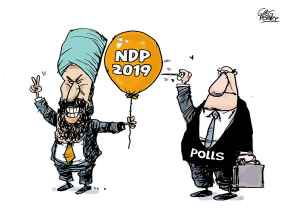Gillette’s ad against toxic masculinity sparks controversy Many missed the spot's point entirely
Read this article for free:
or
Already have an account? Log in here »
To continue reading, please subscribe:
Monthly Digital Subscription
$0 for the first 4 weeks*
- Enjoy unlimited reading on winnipegfreepress.com
- Read the E-Edition, our digital replica newspaper
- Access News Break, our award-winning app
- Play interactive puzzles
*No charge for 4 weeks then price increases to the regular rate of $19.00 plus GST every four weeks. Offer available to new and qualified returning subscribers only. Cancel any time.
Monthly Digital Subscription
$4.75/week*
- Enjoy unlimited reading on winnipegfreepress.com
- Read the E-Edition, our digital replica newspaper
- Access News Break, our award-winning app
- Play interactive puzzles
*Billed as $19 plus GST every four weeks. Cancel any time.
To continue reading, please subscribe:
Add Free Press access to your Brandon Sun subscription for only an additional
$1 for the first 4 weeks*
*Your next subscription payment will increase by $1.00 and you will be charged $16.99 plus GST for four weeks. After four weeks, your payment will increase to $23.99 plus GST every four weeks.
Read unlimited articles for free today:
or
Already have an account? Log in here »
Hey there, time traveller!
This article was published 15/01/2019 (2522 days ago), so information in it may no longer be current.
In a scene in Gillette’s buzzy new ad, a row of men is standing, arranged in a line behind identical smoking barbecue grills that appear to stretch on, ad infinitum. Their arms are crossed, their expressions stoic. They repeat the same monotone refrain: “Boys will be boys will be boys will be boys…”
It’s an evocative image, one of many packed into a powerful one-minute, 48-second spot that tackles everything from bullying to mansplaining to sexual harassment. “Is this the best a man can get?” a man in voiceover asks, a riff on Gillette’s 30-year-old slogan, “the best a man can get.”
The ad goes on to offer a challenge (for men to hold each other accountable, to be allies, to stop making excuses for bad behaviour) and a reminder: “the boys watching today will be the men of tomorrow.”
The spot, entitled We Believe: The Best Men Can Be, is part of a larger campaign from Gillette, whose razors and personal-care products are mostly geared toward men. Along with a pledge to actively challenge gender stereotypes in its advertising and social media going forward, the company will also donate US$1 million per year for three years to non-profit organizations in the U.S. that deliver educational and inspirational programs to boys and men.
https://www.youtube.com/watch?v=koPmuEyP3a0
It’s Gillette for the #MeToo era.
The goals of the ad are laudable and, in many ways, unprecedented. Most strikingly, Gillette actually acknowledges its role in creating the kind of narrow, aspirational ideals about masculinity and what it means to be a man and, in turn, its responsibility to offer a corrective. The ad has been viewed over four million times and counting on YouTube.
Some critics of the ad have expressed legitimate concerns that the company is co-opting the #MeToo movement, and being yet another brand attempting to appear “woke” in order to sell products to millennials.
But overwhelmingly, the backlash brewing online comes courtesy of people who have missed the ad’s point entirely. British TV personality Piers Morgan accused the company of waging “a war against masculinity,” a point that’s been echoed by a litany of troubling (and quickly multiplying) YouTube comments, many calling for a boycott of the company.
I thought it was feminists who were supposed to be sensitive snowflakes, always looking for stuff to be offended by.
And here I thought it was feminists who were supposed to be sensitive snowflakes, always looking for stuff to be offended by.
The ad addresses what is known as “toxic masculinity,” a term that went from academic to mainstream in the past couple of years and refers to the ways in which traditional expectations and expressions of masculinity can harm boys and men. The messages that men must be stoic, aggressive, domineering or tough to be considered “real men” are everywhere, reinforced every time someone tells a boy to “man up” or “stop being a wimp.”
And these messages can be damaging over time. In examining what’s been called the “boy crisis” — an alarming convergence of trends that show boys are falling behind in school, radicalizing online, dying by suicide, and hurting themselves and women — Canadian author Rachel Giese asks an important question in her timely 2018 book, Boys: What It Means To Become a Man: “What if the crisis isn’t about boys, but rather, masculinity?”
The harms of gender stereotyping on boys are not discussed or analyzed with the same frequency as they have been for girls, despite being sides of the same coin. It’s not hard to see how a boy raised to “conquer” and “dominate” on the football field might start to feel the same way about the bedroom. It’s also not hard to see how a man raised to believe in a specific ideal of masculinity might feel emasculated by a TV commercial challenging that very ideal.
Gillette is not saying men are bad. It’s saying that men can be more.
We like to diminish the power of advertising, to downplay its influence on us, to insist it doesn’t shape our culture (an argument to which I will submit Coca-Cola and Santa Claus). But advertising can do more than sell a product. It can also sell a lifestyle, an aspiration, an idea. Why shouldn’t advertising from our most influential and visible brands include greater-good messaging about tearing down damaging gender stereotypes and advocating for empowerment and equality?
Judging from the backlash that greeted Gillette, these are ideas people still need to be sold on.
jen.zoratti@freepress.mb.ca
Twitter: @JenZoratti

Jen Zoratti is a Winnipeg Free Press columnist and author of the newsletter, NEXT, a weekly look towards a post-pandemic future.
Our newsroom depends on a growing audience of readers to power our journalism. If you are not a paid reader, please consider becoming a subscriber.
Our newsroom depends on its audience of readers to power our journalism. Thank you for your support.







